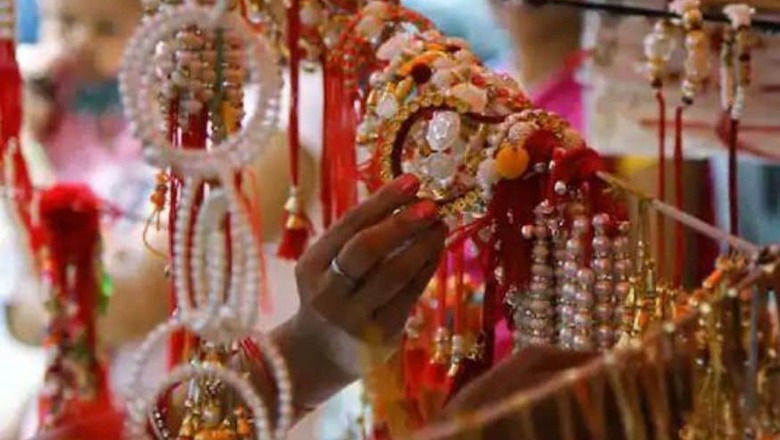Colourful Threads Gather Dust, 'Rakhi' Vendors Sit in Silence as Pandemic Fears Untie Business Hopes

views
Rajbala spends most of her day looking up at people walking past her roadside makeshift shop without a glance or looking down at the silk and cotton 'rakhis' lined up, undisturbed, in a neat arrangement on the pavement. Raksha Bandhan, or Rakhi, one of north India's biggest festivals, is only three days away and she hasn't managed to sell even one 'rakhi'.
The hours hang heavy, one slipping into another without a rupee earned, pushing the 42-year-old 'rakhi' vendor in Uttar Pradesh's Ghaziabad town further into penury.
"There isn't much to do. Nobody has come to buy anything so far," she said dejectedly, dusting once again the colourful threads she has sourced from all over. As the COVID-19 pandemic continues its spread across the country, this is one Rakhi, a festival that celebrates sibling bonds, where many brothers and sisters won't be meeting in large family parties or even small lunches and dinners.
There might be some virtual celebrations but the zing is missing, leading to a joyless season for vendors like Rajbala and small businesses that were hoping to make some money to tide them over the corona crisis.
"Earlier, women would go for a walk in the evening and stop by the shop to buy 'rakhis'. This disease has ruined us completely,' Rajbala, who has been selling 'rakhis' for 15 years, told PTI. After four months of lockdown, the fear of contracting the infection runs deeper than ever.
"I have asked my brothers to tie a 'roli' thread on my behalf. There is no way we are going to risk each other's families in these times by visiting them," said Chhaya Singh, a homemaker in Ghaziabad.
She also has no trust in online shopping. "Who knows how many hands the 'rakhi' will go through before reaching my brother. I don't think it is safe," Singh added. Amrita Mehta, a Gurgaon-based IT professional, would normally travel to Jaipur to meet her brother on the day. But not this year.
"I am apprehensive about visiting my brother in Jaipur. I have sent 'rakhis' to some cousins and told the rest to tie one on their own," Mehta said. The reluctance of Singh and Mehta to celebrate the day spells doom for vendors like Rajbala. And they are only one cog in the festival wheel.
Pepaa, a recycled paper product company, would normally get 15,000 orders for its plantable 'rakhis' (with seeds). This year, the number came down to less than 5,000. The startup deals in nature-friendly products such as plantable paper, notepads, carry bags and calendars, and its 'rakhis', aimed at a more sustainable festival, were a big hit.
"Every year, we reportedly throw away eight million rakhis across the country after the festival. By investing in a plantable rakhi you can do the environment a favour," Coimbatore-based entrepreneur Divya Shetty told PTI over phone. Most corporate offices are closed and with that a major chunk of her revenue is gone as they form the bulk of her clients. Shetty was looking forward to Rakhi to compensate the loss of earnings but that is not happening.
"Over the last few weeks, a lot of areas in major cities across the country have gone back into lockdown. There are no courier services operating in those areas. So yes, sales have dipped this year," Shetty said.
The number of cases in India on Friday crossed the 16 lakh mark with a record single-day surge of 55,078 infections. The number of fatalities has risen to 35,747, according to the Union Health Ministry.
With the coronavirus spread continuing unabated, several states and many cities have either extended the lockdown or implemented intermittent periods of strict lockdown. The lack of demand for Pepaa's products has a ripple effect, Shetty said.
The startup is backed by a team of over 800 farmers and more than 100 women who make the products. "The lockdown has left a lot of people without jobs and resources, but we have made sure that we can at least help those who are working with us in whatever way we can. Our products support a lot of people from the rural background since everything is community-built. I know this is not much, but every little bit helps, I guess," she said.
Similarly, even though business has been "extremely bad" for Jaipur-based startup 21Fools, it is trying to make what is urgent and necessary -- cotton masks and 'rakhis' -- to keep artisans, farmers and self help groups (SHGs) engaged. "Post March, things have been extremely bad. Because of the lockdown we had to completely shut the workshop for three months. Since we are majorly a B2B company and since nobody has been going out to the offices, we realised there may not be any sales for the coming few months," said Divyanshu Asopa, founder and CEO, 21Fools.
The company deals in seed paper products like wedding invitations, coasters, calendars and eco-friendly desk organisers. Working with about 50 people, including some artisans of Sanganer, a few SHGs and organic farmers from Madhya Pradesh, logistics have been one of the largest hurdles this year.
"It has been cumbersome during and after the lockdown. Till now, we are struggling on an everyday basis to get the
'rakhis', dispatch the 'rakhi' on time. We get 'rakhis' from different villages around Jaipur to our workshop. It now takes five-seven days.
"And even after dispatching, many orders are getting cancelled on a day to day basis because many cities have gone back into lockdown," Asopa said. Despite the mounting difficulties, the firm has managed to send out 3,000 orders so far. "I think we are doing a bit better than expected," a hopeful Asopa said.
Rakhi is being celebrated on August 3.


















Comments
0 comment